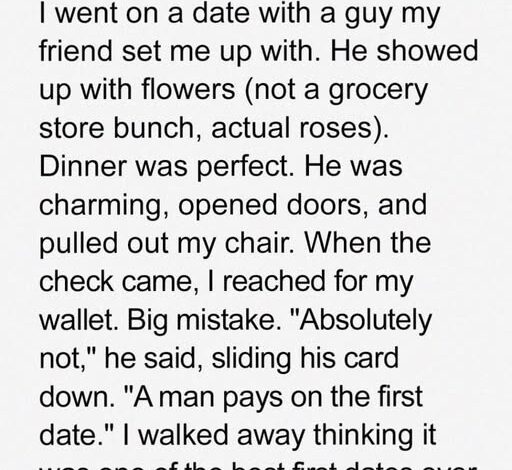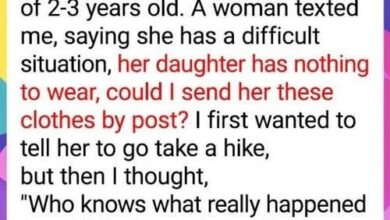
My Date Paid for Dinner, But What Happened Next Left Me Shocked!
When my best friend Mia insisted on setting me up with her boyfriend’s friend, I hesitated. Blind dates were never really my thing—too unpredictable, too awkward. But Mia swore Eric was different: polite, thoughtful, reliable. “He’s one of the good ones,” she said. Against my better judgment, I agreed.
Eric seemed promising at first. His texts were well-written—no lazy abbreviations or late-night half-sentences. He asked about my job, my hobbies, even my favorite coffee order. It was refreshing to talk to someone who didn’t treat conversation like a chore. After a week of back-and-forth, he suggested dinner at a popular Italian restaurant downtown. It felt like a safe choice—public, elegant, and casual enough to avoid first-date pressure.
The evening started on a high note. Eric showed up early, holding a small bouquet of roses. He wore a crisp button-down, clean shoes, and carried himself with quiet confidence. When I arrived, he stood up, smiled warmly, and pulled out my chair. “You look incredible,” he said, handing me the flowers. He even gave me a tiny silver keychain engraved with my initial—a small but surprisingly thoughtful touch.
We clicked easily. The conversation flowed between travel stories, embarrassing childhood moments, and funny dating mishaps. He was attentive, laughed at my jokes, and seemed genuinely interested. By the time dessert came, I thought maybe Mia was right. Maybe he really was one of the good ones.
When the bill arrived, I reached for my purse, out of habit. Eric waved me off with a confident grin. “A man pays on the first date,” he said. It was old-fashioned, but I didn’t argue. It seemed harmless, maybe even sweet in its own way. After dinner, he walked me to my car, waited while I unlocked it, and didn’t try to push for a kiss. He just smiled, said he’d had a wonderful evening, and told me to drive safe. I went home thinking, Wow, that actually went well.
The next morning, I woke up smiling, half-expecting a text that said something like, Last night was great—want to do it again? Instead, I saw an email. The subject line stopped me cold: Invoice for Last Night.
At first, I thought it had to be a joke. But when I opened it, my stomach dropped. The document listed every single thing from the night before—dinner, drinks, flowers, even the keychain—each with a specific dollar amount. And then came the kicker: a line item labeled “Emotional Labor – $50,” with a note underneath that read, “For maintaining engaging conversation.”
At the bottom of the email, a message in bold read: “Failure to comply may result in Chris hearing about it.” Chris was Mia’s boyfriend—the one who had introduced us. The implication was clear: pay up, or he’d stir up drama.
I stared at my screen, stunned. The charming, polite man from last night had turned into something else entirely—petty, manipulative, and disturbingly entitled.
I texted Mia immediately: You’re not going to believe this. Within seconds, she called me. As soon as I read the email out loud, she shouted, “Oh my god, he’s insane! Don’t respond.” She hung up and called Chris.
Apparently, Chris was just as furious. Together, they decided to respond—but not the way Eric expected. They drafted a “mock invoice” in return, charging him for “making someone uncomfortable,” “performing unpaid emotional labor of de-escalation,” and “acting like a walking red flag.” They sent it to him with the note: Payment due immediately. Late fees include being blocked and publicly mocked.
That’s when Eric unraveled. His messages started flooding in—first defensive, then angry, then pitiful. He accused me of “taking advantage of his generosity,” said I “owed him respect,” and finally shifted into self-pity about how “nice guys always finish last.”
I didn’t reply. I blocked his number, his email, everything. Mia and Chris cut him off completely too.
For a few days, I replayed the whole night in my head, trying to pinpoint the moment things had gone sideways. He’d been polite, attentive, even charming. Nothing screamed “dangerous.” But looking back, the clues were there: the way he insisted on paying, the gift that felt a little too personal for a first date, the quiet possessiveness behind the compliments. It wasn’t about generosity—it was about control.
That invoice wasn’t about money. It was a power move. A way of saying, “You owe me something.” And that’s what made it so unsettling.
Mia and I ended up laughing about it eventually—her dramatic reenactment of reading his “charges” helped—but it also became one of those stories that sticks with you. Not because it was ridiculous (though it was), but because it exposed a truth a lot of women already know: sometimes what looks like kindness is just control dressed up in good manners.
People like Eric see generosity as an investment, not a gesture. They keep score. They believe that every dinner, compliment, or small act of thoughtfulness puts the other person in their debt. The moment you don’t repay it—in attention, affection, or obedience—they show their real face.
What started as a simple date turned into a masterclass in boundaries. I learned that red flags aren’t always loud. Sometimes they’re hidden behind polite smiles and grand gestures. Sometimes they smell like roses.
I never sent Eric a response. I didn’t need to. Ignoring him was the final statement—the only “payment” he was getting. And as petty as it sounds, I hope the silence cost him more than the dinner ever did.
Now, when someone insists on paying for everything, I take a beat. Not because generosity is bad—it’s wonderful when it’s genuine—but because I’ve learned that real kindness doesn’t come with conditions, fine print, or follow-up invoices.
In the end, that night didn’t leave me jaded. It left me sharper. I paid attention, as I should have from the start. And that awareness—knowing how to spot entitlement before it’s too late—is worth more than any meal, any bouquet, or any smooth talker pretending to be a gentleman.
So no, I didn’t pay him back. Not the way he wanted. But I paid attention. And that, as far as I’m concerned, was the best investment I’ve ever made.




